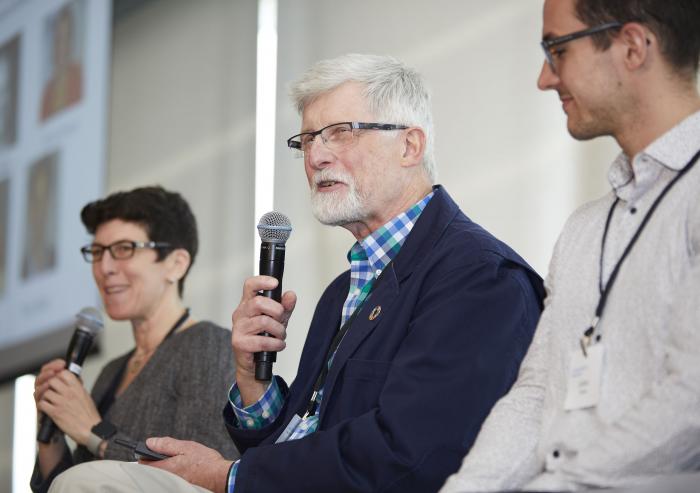Exploring the impact of campus sustainability efforts

Every year, Sustainability Connect, a forum organized by the MIT Office of Sustainability (MITOS), provides an opportunity for MIT community members working on sustainability issues across campus to come together around a cross-cutting theme, celebrate accomplishments, and engage in collective brainstorming. The event furthers MITOS’ mission to transform MIT into a powerful model that generates new ways of responding to the challenges of a changing planet, starting by using our own campus as a testbed.
On May 7, a group of 80 faculty, staff, and students convened for Sustainability Connect 2018 to discuss this year’s theme: “Imagine. Incubate. Impact.” The fourth annual event opened with a keynote from Joi Ito, director of the MIT Media Lab. Ito’s work at the Media Lab — taking big problems in the real world, scaling them down, and then testing, proving, and deploying solutions – deeply aligns with the approach MIT is taking on campus sustainability and provided an inspirational framework for the day’s sessions. Ito stressed the necessity of shifting paradigms when trying to change complex environmental systems.
He also shared a note of optimism about young leaders entering the workforce.
“People’s values are changing,” he said. “When you look at millennials going into companies, they care about the social cause. I think it’s important to harness that.”
The student leaders who participated in Sustainability Connect throughout the day — engaging with the audience to tackle issues such as carbon neutrality and water management on our campus — helped drive this message home.
Deputy Executive Vice President Tony Sharon provided examples of how MIT is already changing the game on sustainability at MIT in his opening remarks, noting progress on the MIT solar farm in North Carolina, the utility of the MIT DataHub, and the recently released Pathways for Sustainability Leadership report.
During the morning session, MITOS took the opportunity to officially launch the Sustainability DataPool, MIT's portal to campus sustainability data. MITOS worked closely with Information Systems and Technology to develop this website, which now enables and invites the community to explore campus datasets and visualizations powered by the MIT DataHub.
“As research suggests, we think there’s a connection between an organization like MIT’s ability to innovate and the accessibility of shared data,” said Derek Wietsma, senior data analyst at MITOS. “As this resource matures, we hope the Sustainability DataPool will play an important role in MIT's ability to develop and implement sustainable solutions.”
The morning sessions spotlighted many staff, students, and faculty at MIT working toward imagining, incubating, and making an impact on a range of campus sustainability topics.
The panel, “The State of Sustainability at MIT,” featured Amanda Graham, executive director of the Environmental Solutions Intiative; Kate Trimble, associate dean of PKG Public Service Center; Christina Lo, the director of Strategic Sourcing and Contracts; and Abigail Francis, assistant dean of LBGTQ+ Services. They discussed sustainability efforts through a multitude of lenses and explored topics ranging from integrating sustainability into the MIT curriculum to activating public service around climate change to advancing equity on campus. Christina Lo spoke about changing the purchasing paradigm at MIT from: “Let’s get what we need” to “Is there another way to think about what our true goals are?”
During a speed talk session, the recipients of the first Sustainability Incubator Awards updated the audience on their research, detailing how they have been using the campus as a test bed. The audience learned about disposable glove recycling, lifecycle analysis of buildings, and capturing and reusing water vapor plumes from the MIT Central Utilities Plant, which could result in significant water savings for the Institute and beyond.
The final panel featured students from a new spring course 11.S938 / 2.S999 (Solving for Carbon Neutrality) designed and taught by Tim Gutowski, a professor of mechanical engineering and Director of Sustainability Julie Newman. The students unveiled their emerging ideas on how MIT might transition to a carbon neutral future free from fossil fuels. The panel featured mechanical engineering graduate students Julien Barber, Caleb Amy, and Colin Kelsall, and economics student Ignacio Ortega Castineiras. They shared a mix of technology and financial models they are currently grappling with as the semester comes to a close.
After engaging in many conversations framed by science and engineering, Heather Paxson, a professor of anthropology gave a lunchtime keynote addressing the connection between culture and food. As MIT explores its own food system — from procurement to growing food on campus — Paxson’s comments reminded attendees that culture also plays an important role in solving for environmental problems.
“Beyond its symbolic capacity, food is also a medium of communication and of social power,” she said. “Food isn’t just culturally relevant — food is culture.”
To conclude the event, the group split up into three workshop tracks to provide input into campus-wide discussions of water management, food and sustainability, and the implementation of the Pathway to Sustainability Leadership report.
“The momentum to shift paradigms, solve complex problems, and cross traditional lines in order to collaborate is building at MIT and can be seen across MIT’s operations already,” said Julie Newman. “This June, we hope to leverage this work and plan for the next decade, finding new ways for MIT to be a game changer in the space of campus sustainability as we seek to implement the new vision outlined the Pathway to Sustainability report.”
For MIT community members who want to get involved in the campus sustainability design process, MITOS encourages participation in the June 1 Pathway to Sustainability implementation forum. Anyone interested is encouraged to RSVP by May 25.


